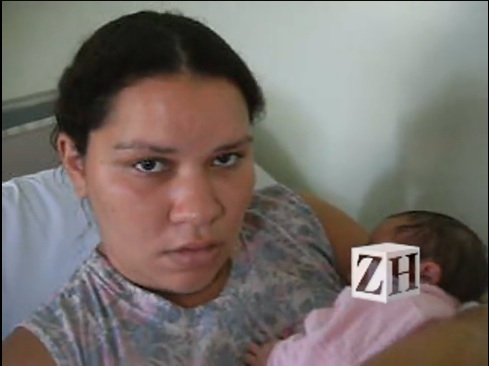Obstetric violence and humanized birth in Brazil
/Student Midwife Oli Armshaw @olvinda has written another post for my blog. With others, we have been corresponding by email over the past few days, following the horrific revelation below.
With sadness and horror I read about Adelir Carmen Lemos de Goés, a 29 year old pregnant woman, in Torres, Rio Grande do Sul, Brazil, being forced by the authorities to have a caesarean, on 1 April.
On 31 March, she had a scan and was examined by a doctor, who said she needed an immediate caesarean as she had already had two previous caesareans, the baby was breech and her pregnancy was 42 weeks.
Adelir, saying she would prefer a VBAC (vaginal birth after caesarean) in the hospital -although there was no staff to support her choice, signed a document taking responsibility for her decision and went home to await labour, with her doula, Stephany Hendz. In the middle of the night, when Adelir was already in established labour, armed police and medical personnel arrived in two military police cars and an ambulance, to force her to Hospital Nossa Senhora dos Navegantes, for a caesarean. In the name of risk to the unborn baby, the doctor had asked judge Liniane Maria Mog da Silva, to issue an injunction to bring her in for caesarean section. She was submitted to surgery by force, against her will. Yesterday, the result of her ultrasound scan circulated on Facebook, showing a gestational age of 40 weeks.

Brazil’s major press, including Globo G1, reported the story on 2April, which you can see here and also translated here. According to Adelir, "Two military police cars came and an ambulance to take us from our house. I was very anxious. I was all but handcuffed," she said, alleging verbal abuse by police.
Here, you can see Adelir speaking about the terrifying experience of police arriving at her house when she was in established labour, contracting every 5 minutes, and being forced to hospital for surgery. You don’t need to understand Portuguese to see how she feels.
The response in Brazil has been mixed: Most Brazilians do not sympathize with Adelir, the outraged birth activists or the ‘crazy feminists’, who support a mother’s right to make her own choices about birth and risk. But there is a strong, groundswell movement for the humanization of birth, fronted by ReHuNa (League for the Humanization of Childbirth), which considers this brutal incident to be an unacceptable breach of human rights, and is demanding that the Justice Department take action to address it. Peaceful protest demonstrations are being staged on 11 April in São Paulo, Rio de Janeiro, Torres, Belem and across the world at all Brazilian embassies. The UK embassy of Brazil is at 16 Cockspur St, London SW1Y 5BL. For more information please visit: weareadelir.blogspot.co.uk

Birth activists have started a petition on Avaaz, which you can sign here, to oppose the infringement on civil liberty, and extreme technical incompetence of doctors and government. They claim the incident not only breaches the Code of Medical Ethics, but goes against basic evidence: “Labour is a safe and appropriate choice for most women who have had one or more previous caesareans” and “pelvic planned vaginal delivery of breech babies may be reasonable under the guidelines of hospital protocols.” (ACOG Bulletin for clinical practice No. 115, 2010). You can read a full translation of the Avaaz petition here.
A formal complaint has been lodged at the Secretariat of Justice and Human Rights of the Presidency of the Republic by Artemis, a Brazilian NGO promoting women's autonomy and the prevention and eradication of all forms of violence against women. Here, you can see their letters on Ligia Moreiras Sena’s blog. @birthrightsorg have responded with this excellent blog on obstetric violence and use of ‘risk’ to legally justify treating women’s bodies “as public objects subject to the whims of the medical profession backed by the coercive power of the state” (Birthrights, 2014). Read also @KathiValeii’s powerful and passionate blog, ‘The war on women just got bloody brutal’ at Birthanarchy.
As Daphne Rattner, president of ReHuNa points out, this incident has occurred in the week that Brazilians are counting fifty years since the military coup d’etat in 1964, making it all the more grimly poignant that armed police were involved in forcing Adelir to hospital for unwanted surgery. It has Brazilians wondering who will be next to be dragged away by police, and if Adelir or her husband, Emerson, had resisted or reacted, would they have been shot?
Thanks to The Iolanthe Midwifery Trust, I’m going to Brazil for an elective midwifery placement at Hopsital Sofia Feldman, a beacon for the humanized model of care in Brazil, and attend the 9th Normal Labour and Birth Conference. It’s going to be an incredible journey back to Brazil, the country I adore. I anticipate learning a lot from the brilliant midwives there, who are committed to supporting women to birth their babies where, how, with whom, and when they want; and fighting for an end to obstetric violence of all kinds.
“Humanized Birth”, as Elis Almeida puts it so powerfully in her blog Parto Humanizado no SUS, (translated here) “contrary to what most people think, is not background music and/or low light at birth, but a set of actions aimed at a satisfying birth experience, in which the woman and the baby are the protagonists, where attention and care are fully focused on the mother and baby dyad, and not on the doctor and institution”. A bill was passed by the government on 25 September 2013 legislating for humanized conditions at birth, but ‘what’, asks Almeida, ‘is the point of having a law if it is not supported and enforced by existing policies and practices?’
I trust that Adelir’s case will mark a turning point, a pivotal moment in the ongoing fight against obstetric violence, and catalyse lucidity and urgent action to humanize childbirth in Brazil.
Oli Armshaw @olvinda, April 2014 #NOobstetricviolence
Oli Armshaw @olvinda, April 2014

